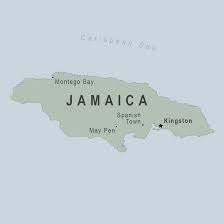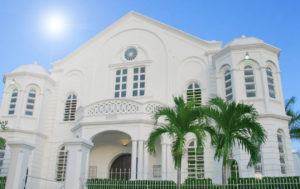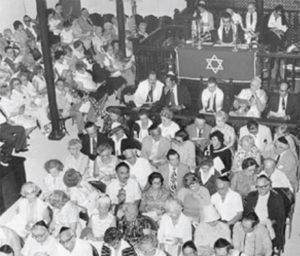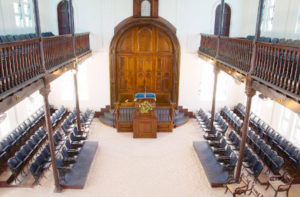 The first Jews came to the island during the Spanish occupation of the Island, 1494-1655. These Jews came from Spain and Portugal. They fled because of the Spanish inquisition. To conceal their identity they referred to themselves as “Portuguese” or “Spanish” and practiced their religion secretly.
The first Jews came to the island during the Spanish occupation of the Island, 1494-1655. These Jews came from Spain and Portugal. They fled because of the Spanish inquisition. To conceal their identity they referred to themselves as “Portuguese” or “Spanish” and practiced their religion secretly.
 Jamaica was granted to Columbus’ descendants as a personal possession. In 1530, Columbus’ grandson Portugallo Colon allowed “secret” Jews to settle on the island, defying the Spanish Inquisition, which mandated death to anyone practicing Judaism. The Jews introduced sugar and vanilla industries to the island. They were also leaders in the island’s international trade and shipping companies. There were also Jewish pirates, who settled in Port Royal.
Jamaica was granted to Columbus’ descendants as a personal possession. In 1530, Columbus’ grandson Portugallo Colon allowed “secret” Jews to settle on the island, defying the Spanish Inquisition, which mandated death to anyone practicing Judaism. The Jews introduced sugar and vanilla industries to the island. They were also leaders in the island’s international trade and shipping companies. There were also Jewish pirates, who settled in Port Royal.
At the time of the British conquest of the island in 1655, General Venables recorded the presence of many “Portuguese” in Jamaica. The Jews were allowed to remain after the conquest and began to practice their religion openly. Jewish settlers made their homes in Port Royal, Spanish Town, and Kingston. Pockets lived in smaller island towns, like Falmouth and Montego Bay. They were granted British citizenship by Cromwell, as Jamaica’s Jews pledged to help England conquer the island from Spain. The status of British citizenship enabled ownership of property by the Jews. In 1693, a special tax was imposed on the Jews. By 1700, although Jews were second class citizens and bore the weight of the island’s taxes, they were generally prosperous. In the 1740s, King George II lifted the undue taxation. They attained full political rights in 1831. In Jamaica in the 1800s, there were as many as eight synagogues, twenty one Jewish cemeteries and roughly 2,500 Jews.
 During the 18th and early 19th century, Jews emigrated from Curacao and Germany. After that influx, immigration subsided, but rose again in the late 19th century with the arrival of Jews from Egypt and Syria. By the early 20th century, the economic prosperity witnessed during the 19th century began to decline; consequently, many Jews immigrated to the United States and England. Approximately 300 Polish Jews and 500 Dutch Jews were housed in the Gibraltar refugee camp between 1942 and 1944. The American Jewish Joint Distribution Committee financed the Jewish portion of the camp.
During the 18th and early 19th century, Jews emigrated from Curacao and Germany. After that influx, immigration subsided, but rose again in the late 19th century with the arrival of Jews from Egypt and Syria. By the early 20th century, the economic prosperity witnessed during the 19th century began to decline; consequently, many Jews immigrated to the United States and England. Approximately 300 Polish Jews and 500 Dutch Jews were housed in the Gibraltar refugee camp between 1942 and 1944. The American Jewish Joint Distribution Committee financed the Jewish portion of the camp.
In the mid-1970s, there was a massive Jewish migration out of Jamaica, as industrial unrest and leftward political shifts led to high levels of social and economic upheaval. Among the migrants was the synagogue’s then spiritual leader, Englishman Rabbi Bernard Hooker who left the shul to retire in his homeland. His exit left the synagogue leaderless. The void was filled by a series of dynamic lay people until 2011. Rabbi Dana Kaplan was hired and is the first rabbinically ordained leader the Jamaican Jewish community had had in three decades. During every service, the congregation still recites the Portuguese prayer, “for our brethren who are imprisoned by the Inquisition.”
 Kingston is home to the majority of Jamaica’s Jews and its only synagogue, Shaare Shalom, and Hillel Academy. The Sharei Shalom synagogue is a pearly white structure with one main prayer room that seats around 350 people. It was resurrected in 1907 after previously being destroyed in an earthquake. Shaare Shalom has high beams and almost-majestic turquoise window coverings. The floor is covered in white sand, a Sephardic tradition that goes back to the days of the Inquisition when Spanish Jews had to hide their identity. Sand muffles the sounds of footsteps and praying, and the footsteps leave no trace. The sand has to be changed every 10 years or so, because it gets dirty and the wind blows it out.
Kingston is home to the majority of Jamaica’s Jews and its only synagogue, Shaare Shalom, and Hillel Academy. The Sharei Shalom synagogue is a pearly white structure with one main prayer room that seats around 350 people. It was resurrected in 1907 after previously being destroyed in an earthquake. Shaare Shalom has high beams and almost-majestic turquoise window coverings. The floor is covered in white sand, a Sephardic tradition that goes back to the days of the Inquisition when Spanish Jews had to hide their identity. Sand muffles the sounds of footsteps and praying, and the footsteps leave no trace. The sand has to be changed every 10 years or so, because it gets dirty and the wind blows it out.
In 2005 there were around 200 practising Jews. A lot of native people have discovered their roots and are coming back to Judaism. A recent study has estimated that nearly 424,000 Jamaicans are descendants of Jewish (Sephardic) immigrants to Jamaica from Portugal and Spain from 1494 to the present, either by birth or ancestry. Jewish documents, gravestones written in Hebrew and recent DNA testing have proven this. While many are non-practicing of Judaism, it is recorded that over 20,000 Jamaicans religiously identify as Jews.